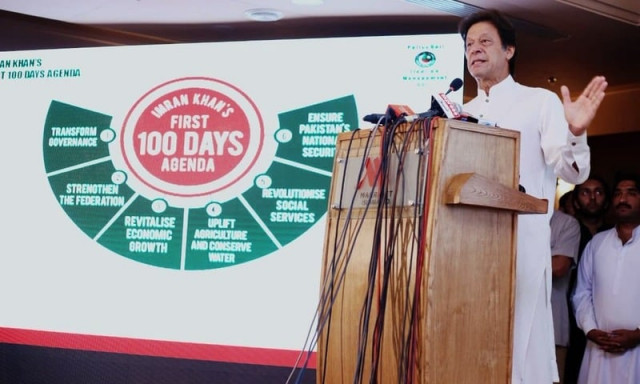Despite slogans, people see no sign of change
Pakistan can become more competitive and self-reliant if changes are brought in five critical areas

PM Imran Khan during the unveiling of PTI's 100-day agenda earlier this year. PHOTO: PTI
It has been about four months and many ardent followers of Prime Minister Imran Khan are becoming disillusioned as they are seeing no signs of any change. But a vast majority of PTI well-wishers are still hoping that the change would come. If the hopes are to be kept alive, it is time to make a beginning for change.
Here are five areas where change has to be brought about. These changes, even if achieved partially, could go a long way in enabling Pakistan to become more competitive and self-reliant, thus not having to seek loans and external financial assistance every few years.
First, for several decades, Pakistan’s spending priorities have been lopsided. Instead of allocating adequate resources for fighting illiteracy, the priority has been to spend on defence. Pakistan spends less than 2% of its gross domestic product (GDP) on education - one of the lowest in the world - while over 3% - one of the highest in the world - goes to defence.
As a result, the country has become a proud nuclear state but one with shamefully low literacy rate. If we are to achieve the United Nations’ Sustainable Development Goal of ensuring adult literacy by 2030, we need to increase the yearly growth rate of enrollment in schools from the present 0.92% to 3.8% or four times.
If we are able to meet this goal in the next five years, we would have taken a big step towards reducing poverty, promoting gender equality and improving competitiveness.
Secondly, Pakistan’s political landscape has been gradually deteriorating and becoming more confrontational. We need to change this to a more harmonious one. So far, most of the energy of every incoming government has been on finding faults with whatever happened in the past. We have to keep the words of Socrates in mind: “The secret of change is to focus all of our energy, not on fighting the old, but on building the new.”
As in the past, there seems to be very little emphasis on building the new. Due to this polarity, parliament is dysfunctional. There are no parliamentary committees. In its four sessions so far, the National Assembly has not passed any legislation, except the mini-budget.
The parties in parliament are busy scoring points and blaming each other for various ills of the country. This needs to change. Parliament has now to be made more functional compared to the past.
Thirdly, for too long Pakistan has been following policies of isolationism. It is perhaps the only country in the world that has barbed wires along most of its borders. Pakistan has higher tariff walls than almost any other country in the world. Neither people nor goods can easily cross Pakistan’s borders. It is never easy for foreigners to get visas for Pakistan.
A large number of INGOs have been asked to leave the country. Many of them have an excellent track record of serving the downtrodden and helping to bring about greater transparency and improvement in governance. It is time to reintegrate with the rest of the world.
We could unilaterally announce visa abolition for most countries, put a moratorium on more fencing, liberalise the economy and re-invite the INGOs already expelled from the country.
Fourthly, Pakistan has been a rent-seeking country for a long time. The elite, whether in the civil service and others, have carved out too many benefits for themselves.
Similarly, there are some sectors of economy, which are far more pampered than others through tax policies and other state largesse. Even the richest of agriculture landholders are exempt from any income tax. Some industries enjoy complete monopoly of tariff protection (autos) and subsidies (sugar) crowding out the others. It is time to create a level playing field.
Finally, Pakistan is building three north-south trade routes - the eastern, central and western routes. It needs to inter-space them with a flourishing east-west route. This will create far more trade and economic activity than any of the north-south routes. This will also bring peace with Pakistan’s neighbours.
With the opening of Kartarpur border, there are some early hopeful signs of this happening. This government is fortunate to have the support of various institutions, which matter in such decisions. All the government needs is to persevere on this path.
It is not corruption but lack of competitiveness, which is the root cause of most of the country’s problems. The country could regain its competitiveness if it shifts its aims to increasing literacy rate, improving institutions, reducing rent-seeking and achieving integration with the rest of the world.
These changes could have a knock-on effect on all sectors and bring about a real change, which has eluded the country so far.
The writer served as Pakistan’s ambassador to the WTO from 2002 to 2008
Published in The Express Tribune, December 17th, 2018.
Like Business on Facebook, follow @TribuneBiz on Twitter to stay informed and join in the conversation.


1733130350-0/Untitled-design-(76)1733130350-0-208x130.webp)
















COMMENTS
Comments are moderated and generally will be posted if they are on-topic and not abusive.
For more information, please see our Comments FAQ